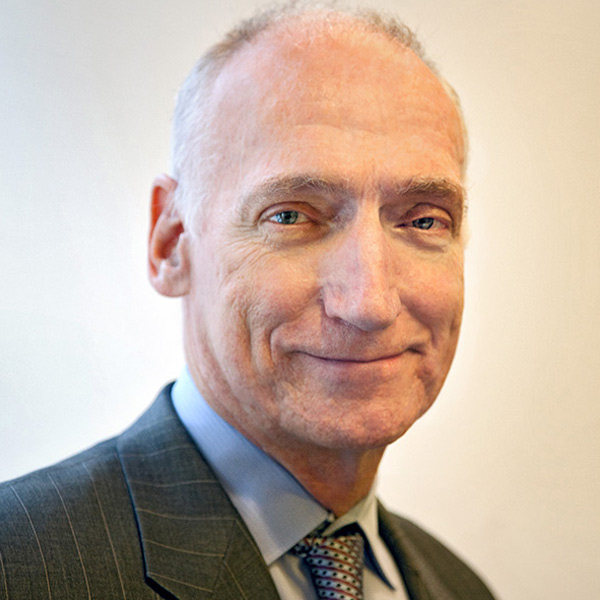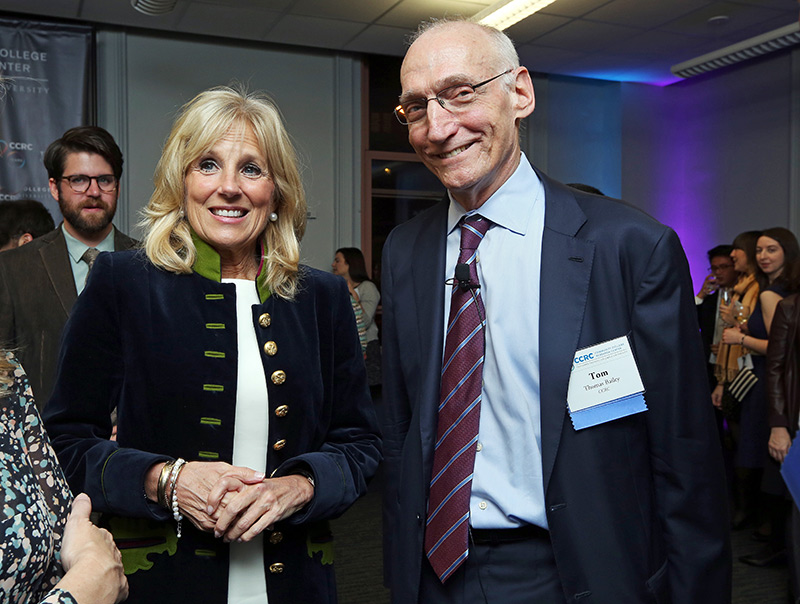Teachers College has named Thomas R. Bailey, an education economist who is widely considered the nation’s leading authority on community colleges, as its 11th president. Bailey, a 27-year member of TC’s faculty, will take up his duties on July 1, 2018, succeeding current President Susan H. Fuhrman, who has served since fall 2006.
Bailey’s credentials as an education researcher and experience as the founding director of TC’s Community College Research Center make him “a consensus choice to lead any great school of education,” said William D. Rueckert, Chair of Teachers College’s Board of Trustees. “But at Teachers College, where we are in the midst of so many critical important projects and opportunities, the value of a President who knows the institution and its people – and who is, in turn, known and respected – cannot be overstated.”
And Leslie Nelson, a TC Trustee who chaired the committee that recommended Bailey to the full Board, called him “the ideal person” to build on “significant advances in research, professional education and practice made under Susan Fuhrman’s leadership” and to “guide the College into a new era of innovation and excellence.”

CONSENSUS CHOICE Bailey is seen as “the ideal person” to guide TC into “a new era of innovation and excellence.”
Bailey, currently the George & Abby O’Neill Professor of Economics & Education, said his new role is “a great honor and a wonderful opportunity to take the lessons I’ve learned in my field and project them into a much broader area. I’ve spent my career seeking to improve opportunities for immigrants, people of color, low-income students. Those are the same motivations I bring to TC’s presidency, where, working with thousands of TC students, staff, faculty and researchers, I have the opportunity to make a much greater impact.”
“I’ve spent my career seeking to improve opportunities for immigrants, people of color, low-income students, all of whom are over-represented in community colleges. Those are the same motivations I bring to TC’s presidency, where, working with thousands of TC students, staff, faculty and researchers, I have the opportunity to make a much greater impact.”
— Thomas R. Bailey
Bailey called Teachers College “an institution whose devotion to bringing education, health and psychology to bear against society’s inequities is part of its DNA.” He said he hopes to promote even greater collaboration across disciplines, involve more faculty in applying for research funding, encourage research focused on interventions that can be applied on a large scale, and above all, advocate for education as “a fundamental function of society.”
“This is an incredibly important time for TC,” Bailey said. “Profound inequities remain in our society and education system. We have witnessed a quiet re-segregation of schools throughout much of the nation, and we are now hearing challenges in the public discourse that question the fundamental value of higher education. The importance of TC and other schools of education in responding to these challenges, in advancing equity, providing crucial research that can deliver the foundation of reform and in training students who will go on to make improvements in education has never been higher. The solutions to today’s problems require the type of broad strategy enabled by TC’s comprehensive approach to education of the whole person, inside and outside the classroom, in the fields of psychology, education and health.”
That philosophy aptly summarizes the approach that Bailey, who earned his B.A. and Ph.D. in Economics from Harvard and MIT, respectively, has taken in analyzing labor, higher education and, more specifically, community colleges, which currently serve more than half of all low-income students of color in higher education.
“If you are interested in educational equity, community colleges should be central to your agenda,” he said. “Educators and policymakers are justifiably concerned about opening up access to the elite, selective colleges and universities, yet there are more low-income, minority students in Bronx Community College than in the entire Ivy League.”

HIGH PRAISE In 2016, then-Second Lady Jill Biden, herself a community college educator, credited Bailey with identifying “the challenges community college students face and paths to overcoming them.”
While community colleges have become an area of intense focus in recent years, Bailey is generally credited with having shaped the field, and he and CCRC have continued to drive the conversation. It’s thanks to Bailey that “we can identify the challenges community college students face and paths to overcoming them, and make better investments in what works,” then-Second Lady Jill Biden, herself a community college professor, said at CCRC’s 20th anniversary celebration two years ago.
“The solutions to today’s problems require the type of broad strategy enabled by TC’s comprehensive approach to education of the whole person, inside and outside the classroom, in the fields of psychology, education and health.”
— Thomas R. Bailey
And James Jacobs, former President of Macomb Community College, has said that “when the CCRC was started by Tom, community colleges were basically in the backwoods of any kind of research. Over the years, through his creativity and his persistence, Tom has really built a research agenda that is increasingly the agenda for all of us in community colleges.”
Perhaps Bailey’s signature achievement has been to drive a change in focus at community colleges from providing universal access to offering higher quality instruction and striving to ensure that all students to complete their degrees.
“When we started, I would say that 95 percent of community college presidents could not have told you their graduation rate, especially in the public sector,” Bailey says. “The reason is that colleges in the public sector are paid on enrollments, so if your enrollment went up, you got paid more money. It didn’t matter if you replaced the entire freshman class every year and never had a sophomore – as long as your enrollment went up, you were paid more money.”
In 2004, under Bailey’s leadership, CCRC served as a founding partner in the creation of Achieving the Dream, a nationwide initiative to prompt community colleges to assess their own practices, “face the data,” and take research-based measures to boost their graduation rates.
CCRC, which now boasts a staff of 65 people and conducts some 40 projects per year, has since taken the lead in assessing strategies aimed at achieving that result, including dual enrollment, remedial education, digital learning, financial aid, career and workforce education, and institutional financing. The Center has made a particularly powerful case for changing the criteria for assigning students to remedial courses, a route that derails many from ever completing a degree.
Most recently, in their landmark 2015 book Redesigning America’s Community Colleges: A Clearer Path to Student Success (Harvard University Press), Bailey, Shanna Smith Jaggars and Davis Jenkins champion a guided pathways approach, which holds that students are more likely to complete a degree if they choose a program and develop an academic plan early on rather than navigating the typical “cafeteria menu” of disconnected courses, programs and support services. More than 250 colleges in 28 states are now working on the implementation of the guided pathways reform model articulated in the book.
In 2010, Bailey was also appointed by U.S. Secretary of Education Arne Duncan to chair the Committee on Measures of Student Success, which developed recommendations for community colleges to comply with completion rate disclosure requirements under the Higher Education Opportunity Act. And Bailey also has directed three national centers funded by the U.S. Department of Education’s Institute of Education Sciences: The Center for the Analysis of Postsecondary Readiness, the Center for Analysis of Postsecondary Education and Employment, and the National Center for Postsecondary Research, all based at TC.
Among the lessons he’s learned, Bailey says, is the importance of addressing issues holistically. “If you focus on just one aspect of the problem – say, remedial courses – it’s not going to make a difference if you haven’t changed the rest of the pathway students are on. That takes multiple perspectives -- and that’s why I’m so excited about leading TC. We can address policy, the brain, psychology, nutrition – and there are so many more possibilities for creating synergies. We have the right values, and the potential for this institution is huge.”
For more about Thomas Bailey read:
“We Must Do More”: At CCRC’s 20th anniversary celebration, Jill Biden calls for greater investment in community colleges, a story on TC's website
“Rethinking the 'Cafeteria' Approach to Community College” an opinion piece by Bailey in The Washington Post